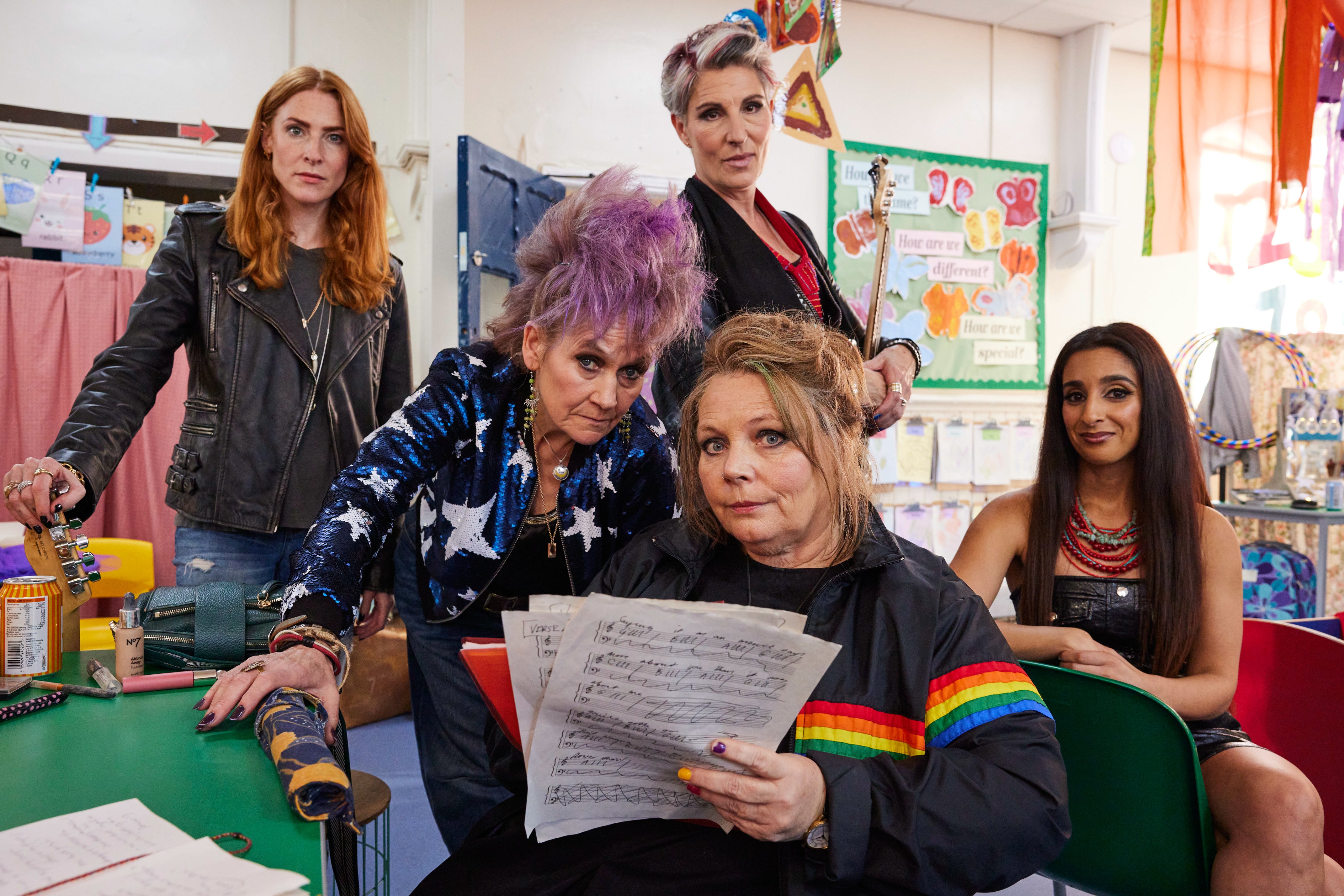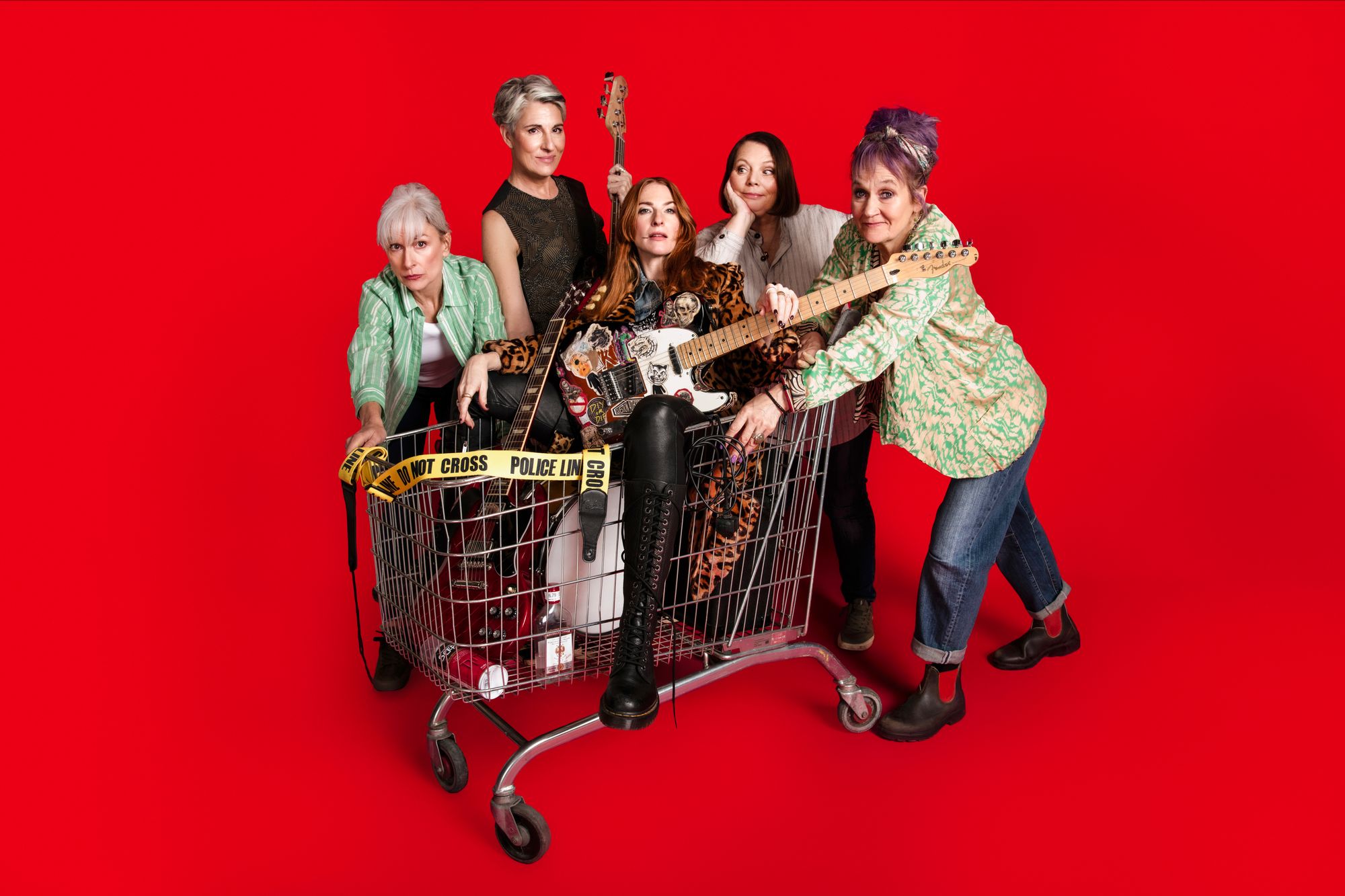Well, this is a bit of a downer, isn’t it? Those were my precise thoughts about halfway through the first episode of Riot Women, the new BBC One drama from Happy Valley mastermind Sally Wainwright. Like Happy Valley, it’s set around Calderdale in West Yorkshire; like Happy Valley, its focus is firmly trained on women in midlife. But somehow, the introductory 30 minutes or so of Riot Women seemed to be even more depressing than a show that dealt with inherited trauma, addiction, murder and sexual assault. Or so I thought.
The opening scenes are certainly pretty harrowing. Beth, a menopausal English teacher played by The Thick of It’s Joanna Scanlan, is about to take her own life, until the phone rings; her brother is on the other end, complaining about the cost of the care home that she has selected for their mother, who has dementia (the undertone of their conversation, inevitably, is that Beth should be the one to shoulder the caring responsibility).
When Beth arrives at school, her pupils seem to look straight through her; when she opens up to a colleague about her suicidal intent, he deflects and brushes her off, as if her feelings are somehow utterly invalid. “Do you think women of a certain age become invisible?” she asks later. Christ, I thought. I’m 33 – is this what I have to look forward to in a decade or two? Being overlooked, undervalued and outright ignored? Getting asked if I’ve “considered HRT” whenever I express any emotion that’s deemed a bit tricky?
But I shouldn’t have judged Sally Wainwright so quickly. Because, with a flick of the writer’s pen, Beth’s life is about to change. Her friend, the straight-talking pub landlady Jess, played by Sherwood’s Lorraine Ashbourne, is putting together a rock band to play in a talent competition at her grandkids’ school. And she wants Beth, who plays piano, to enter the fold.
At first, the group’s ambitions don’t extend much further than getting through a cover of Abba’s “Waterloo”. They’re semi-resigned to the fact that they’ll be at worst a laughing stock, at best a novelty act (Jess’s daughter suggests that they name themselves The Old Bags Department). But soon they find that music is a cathartic outlet, helping them open up about hot flushes, mood swings and everything else that they’re contending with. “And you thought The Clash were angry,” Beth says.

Watching the band – which also comprises shoplifter-turned-singer Kitty (West End star Rosalie Craig), retired police officer Holly (Tamsin Greig) on bass and her midwife sister Yvonne (Amelia Bullmore) on guitar – grow in confidence, and in audacity, is frankly, well, a riot. The women stop second-guessing themselves, no longer putting a polite, palatable spin on their feelings or the changes that their bodies are going through. Not everyone “gets” it, but the sense of liberation is palpable.

It’s not just the physical and emotional changes that come with the menopause that Wainwright and her actors deal with beautifully; they also grapple with the burden that comes with being part of the “sandwich” generation, supporting their teenage or twentysomething children while looking after their ageing parents. Wainwright’s own mother had dementia, and it’s not hard to see how her experiences must have informed one painfully poignant scene later in the series, where Holly must explain to her elderly but suddenly childlike mother (played by Last Tango in Halifax star Anne Reid) that her own parents are long dead.
The women stop second-guessing themselves, no longer putting a polite, palatable spin on their feelings or the changes that their bodies are going through
I can only imagine how validating it must be for women who are going through similar experiences in midlife to see the reality of menopause play out on screen, in a way that goes far deeper than predictable jokes about night sweats but also feels somehow invigorating. It’s powerful and a bit taboo-busting, the televisual equivalent of a bunch of fiftysomethings sticking two fingers up at the world.
And it’s also vital viewing for younger women too. The reality might sometimes be bleak, sometimes messy, but the collective silence around menopause (which only seems to have started to lift, and slowly at that, within the past decade or so) means that most of us reach this point with very little idea about what to expect. That lack of knowledge surely makes us more likely to shrug off or downplay symptoms; it certainly means that we’re not properly equipped to deal with such a major change. I’m sure I’m not alone among other female twenty- and thirtysomethings when I say that it’s something I’ve never even discussed properly with my own mum.

A series like this helps to open up that conversation – and while it doesn’t shy away from the pain of being suddenly deemed invisible by society, it also leans into the sheer power that comes with upturning expectations, shrugging off shame and refusing to shut up. When they’re on stage, the women are having the time of their lives, a reminder that joy and silliness aren’t the preserve of the young.
Wainwright recently said that she wanted to find a way to talk about being a woman in midlife “that was energising and uplifting and offered a solution”. With this show, she’s done just that. When I grow up, I definitely want to be a riot woman.
If you are experiencing feelings of distress and isolation, or are struggling to cope, The Samaritans offers support; you can speak to someone for free over the phone, in confidence, on 116 123 (UK and ROI), email jo@samaritans.org, or visit the Samaritans website to find details of your nearest branch.
If you are based in the USA, and you or someone you know needs mental health assistance right now, call National Suicide Prevention Helpline on 1-800-273-TALK (8255). The Helpline is a free, confidential crisis hotline that is available to everyone 24 hours a day, seven days a week.
If you are in another country, you can go to www.befrienders.org to find a helpline near you.

.jpeg)















.jpg?trim=0,0,0,0&width=1200&height=800&crop=1200:800)





.jpeg)













 English (US) ·
English (US) ·